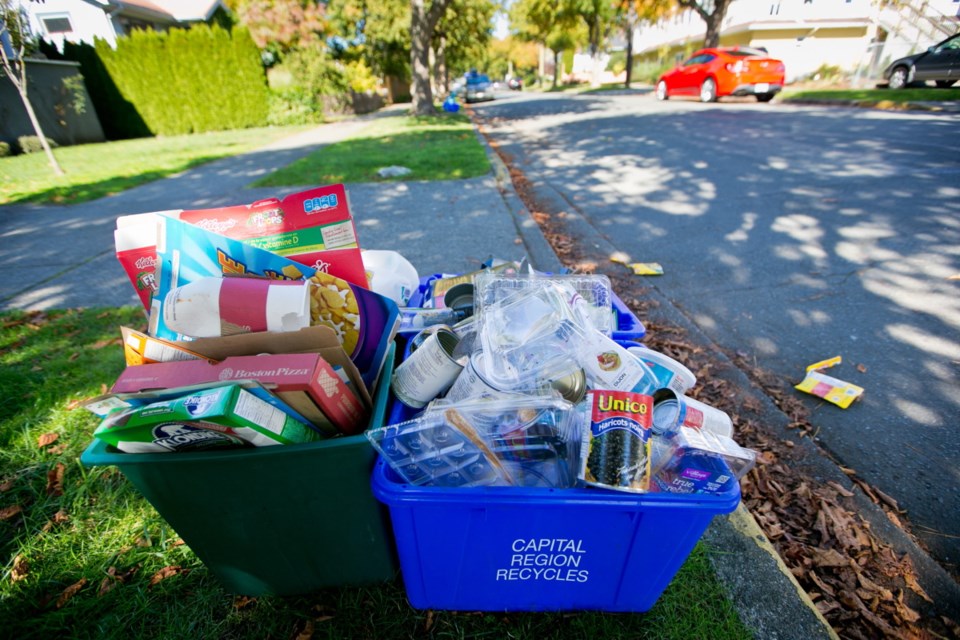We just learned that a one-man submarine exploring the deepest place on Earth, the Marianas Trench, found garbage lying on the ocean floor 11 kilometres under the surface of the Pacific.
That really shouldn’t surprise us. Three years ago, the World Economic Forum predicted that by 2050, the plastic garbage floating in our oceans will outweigh the fish.
Even when plastic makes it into the recycling stream, trouble exists. China, which for years bought much of the world’s recycled plastics, hit the brakes in 2018, becoming much more discerning about what it will take.
The country generates enough of its own plastic waste now, no longer sees the need to feed its factories with unwanted, often contaminated, materials from the other side of the planet. With China out of the game, those who collect recycling are struggling to find places willing to take it.
It’s against that background that, this week, Victoria’s three Bottle Depot outlets stopped accepting not only the recyclables you’re supposed to leave in your blue box for collection at curbside, but also the soft plastics and Styrofoam that you aren’t. They’re the stuff that particularly conscientious recyclers drop off at designated depots. There are still a handful of other places around town that will accept such packaging, but the Bottle Depot found doing so to be a money-loser.
Can you connect the dots between what’s happening in China and Victoria? Not really. When we do remember to recycle our plastic, it gets processed in B.C., not Beijing — though when we chuck it in the trash, we’re part of a global garbage crisis.
B.C.’s household recycling system is unique in North America. In 2013, the provincial government decided Recycle B.C. should not only be funded by the companies that produce the materials being recycled but should be run by them, too.
Recycle B.C. has standardized what British Columbians may and may not chuck in the blue box. Excluded are bags and other soft plastics — anything you can poke your finger through — because they jam the machinery when processed with sturdier containers. Ditto for hard-to-handle flexible packaging such as onion bags, stand-up pouches and zipper bags. Likewise, foam meat trays and the like are banned because they tend to crumble and are too hard to separate from the other blue box bits.
While blue box and non-blue box plastics must be processed separately, they all end up being sold to the same place, the Lower Mainland’s Merlin Plastics, which turns them into base material for a variety of products. So, no, your Skippy container doesn’t go to China. Still, the shifting marketplace has allowed processors to be much more picky about the quality of plastic they will accept.
The main point Recycle B.C. wants to make is that Victoria still has eight depots — four London Drugs locations, the Hartland recycling centre, the Esquimalt and Sidney Return-Its and, for those with the magic car window decal, the Oak Bay public works yard — that will take the soft plastics and foam that the Bottle Depot now won’t. (There’s also an unaffiliated Sooke-based processor called PMD that holds monthly collections at various sites around Greater Victoria; it works with schools and non-profits, which charge a small fee to take the same materials.)
And no, Recycling B.C. says, your blue box contributions won’t go to the dump (at least, they won’t if you clean the residue out of the peanut butter container). Recycling religion relies on residents having faith that the system works, that all that paper, glass and plastic will have a second life.
The economics facing the world’s recyclers are challenging, though. And, to repeat, that’s just when we actually recycle. The world is awash in discarded plastic, in single-use packaging. This is supposed to be the green, enlightened generation, but in reality, we are collectively more wasteful than all who came before us.
It’s built in. At the grocery checkout, the cashier asks you if you want your meat, already encased in a shrink-wrapped foam meat tray, stuck in yet another plastic bag to separate it from the rest of the food. When you stop at the bakery for a treat, the clerk hands it to you in some sort of wrapper, which you toss in the garbage can outside the store while scarfing down the doughnut that really didn’t need any packaging at all. Why do we throw out plastic dish-soap bottles instead of refilling them at the store? And on and on.
The real answer to plastic pollution isn’t recycling. It’s not using so much stuff in the first place.
But when we do, at least we can dispose of it properly.



